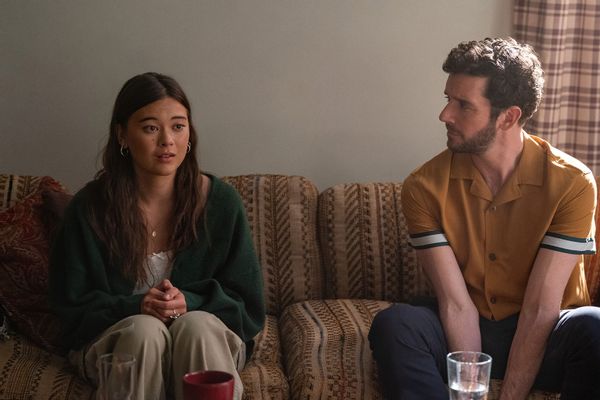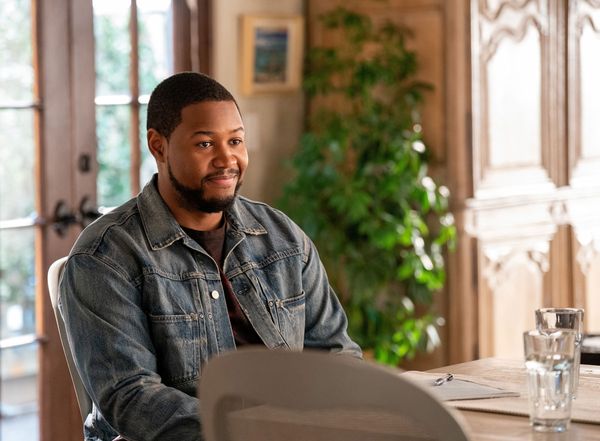
Therapy rarely begins smoothly. Initial sessions tend to be colored by weeping, hesitancy and half-truths as the clinician and client get a feel for each other. You could say the same of many TV shows, but since we’re talking about “Shrinking,” surely you see parallels. Season 1 was all awkward introductions, with Jason Segel’s Jimmy Laird sticking his hand out for a nice-to-meet-you shake, with standard-issue TV wounded healer listed on his Hello My Name Is tag. Jimmy, our psychologist, is barely making it through talk therapy sessions because he’s not quite holding it together.
We’re dropped into Jimmy’s life not long after his wife died, leaving him and their teen daughter Alice (Lukita Maxwell) to make sense of the unthinkable. At work, his mentor Paul (Harrison Ford) acts more like a father figure toward Jimmy, and his colleague Gaby (Jessica Williams), who was also Tia’s best friend, ends up sleeping with him.
All this spins around Jimmy’s wild prescriptions to his most unstable patients, including Sean (Luke Tennie), a veteran whose tour in Afghanistan left him with explosive rage and PTSD. But just as Jimmy starts to pull his life together again, his patient Grace (Heidi Gardner) pushes her abusive ex off a cliff.
Listing these catch-up details reveals the introductory episodes’ overemphasis on the situation instead of leaning into the comedy of it all. The cast’s performances and undeniable chemistry shored up the many fissures threatening to collapse the premise’s integrity—at least, enough to pull us through.
Around 18 months after that ending, the healing can officially begin.
The only obligation “Shrinking” has is to make us laugh, and to the credit of its creators Segel, Bill Lawrence and Brett Goldstein, that quickly became its emphasis midway through its 10-episode first season. Simply maintaining its funny wouldn’t be especially remarkable, regardless of Ford’s admirable comic timing as the group’s unofficially patriarch/wise man/curmudgeon.
Luckily these new episodes escalate the stakes, hitting us in our feelings similarly to the way Lawrence’s and Goldstein’s other great Apple TV+ plus show met us four years ago.
Invoking “Ted Lasso” nowadays nets mixed reactions, but our first taste of that sugar came back in 2020 when rancor and bitterness defined our existence. Its magic was in reminding us of a basic truth that humans can be and usually are good to each other.
“Shrinking,” being a show about therapy and grief, asks us to consider something brave — especially before an election that has many hyperventilating into paper bags. It proposes we practice empathy and consider granting absolution to the people who gravely hurt us.

Tia didn’t just keel over, remember. She was killed by a drunk driver. Alice isn’t another surly teen. She was abandoned by her father when she needed him most, taking emotional refuge with their next-door neighbor Liz (Christa Miller) and her go-along-to-get-along husband Derek (Ted McGinley).
Lawrence, something of a master of the heart-forward, quirky sitcom, dialed the original therapy themes back for a while to recreate something closer to “Cougar Town” in its best seasons.
Which is to say, “Shrinking” has settled into the salving vibe of a hangout comedy, what with Jimmy’s workplace and neighborhood families of choice comfortably overlapping without sacrificing the therapeutic spaces that make it distinct. It reminds us that everybody is aching in some way and therefore deserving of forbearance.
For the most part that’s an easy proposition since nobody in Jimmy’s orbit is unlikeable. Even when Damon Wayans Jr. shows up as a romantic possibility for Gaby, nobody can find anything bad to say about him. Not even Jimmy.
“Shrinking” makes a strong case for expanding the episode counts for stories that are worth the additional time, with 12 episodes to work with instead of 10. Instead of existing to prop up one or two main characters, the show gives us an ensemble whose individual lives and personalities merit fuller examination. (That’s also true of Goldstein’s character, the antithesis of Roy Kent, which Apple TV+ has asked critics to keep under wraps until he’s introduced.)
Miller’s Liz probably gets the shortest stick of all the regular players, but a subplot fleshing out her character’s relationship dynamic with McGinley’s Derek transforms his character from an eternally smiling goofball into something lovelier and more fragile than the background figure barely introduced last year.
The writers rightly assume that viewers aren’t troubling themselves much about the questionable ethics of the lead character’s methods: For all of Paul’s finger-wagging at Jimmy’s professional lapses, we wouldn’t trade a moment of Paul’s romance with his former neurologist Julie (Wendie Malick). Doctor-patient boundaries? Whatever. Malick and Ford are brilliant together.
Against all odds and ethical soundness, Sean is now Jimmy’s greatest success story in part because he moved into his pool house and redirected his rage into full-contact mixed martial arts classes.

He and Liz run a food truck together, as well as giving her and Jimmy’s wealthy households a reason to bank together and rail against one of their racist neighbors – something the writers effectively surface now and then as a running joke.
But the latest chapters (11 of which were made available to review) keep enough of that treatment theme going to grant the comedy heft and heart, earning the moments when someone’s stifled anguish or self-doubt gets the better of them.
Grace, in her way, becomes the thematic mascot of a new season that widens its panorama beyond Jimmy’s issues. In the premiere, Segel’s character seizes on someone’s offhanded description of his meddling as “Jimmying” and tries to make it his “thing,” despite Grace taking his advice a little too literally and far.
Now she’s in jail with no interest in getting sprung. She believes her inner flaws are too big to mend, in the same way the onset of Paul’s Parkinson’s symptoms forces him to confront his ego and the ways it has stymied his connections with others.
Gaby’s humor and flagrant success mask nuggets of self-resentment and low-key dread at having to assume some of the caretaking duties for her mother that she’s largely left with a sister (Courtney Taylor), a recovering addict who resents being saddled with that responsibility.
Season 2’s best subplots follow Tennie’s Sean and Michael Urie’s Brian, who fully blooms a performance that balances outsized physical humor with surprising depth and he and his husband Charlie (Devin Kawaoka) consider expanding their family.
In the meantime, Sean’s forward progress slams to a halt when the father (Kenajuan Bentley) he’s been avoiding comes back into the picture. So do others who threaten the group’s peace and equilibrium.
In each person's story, there are reasons for their missteps and a way through, especially when that road seems to be closed or unnavigable.
“Sometimes the idea of forgiving someone feels, like, impossible,” Jimmy tells someone. “Then you realize that the villain in your story is just a person who made a big mistake.”
Granted, that prescription won’t close our culture’s sanity rift. But if we can narrow our efforts to millions of one-on-one interactions, that could be the start of something.
"Shrinking" returns with a two-episode premiere on Wednesday, October 16 on Apple TV+. New episodes premiere weekly on Wednesdays.







